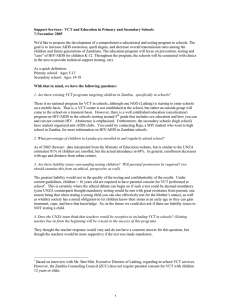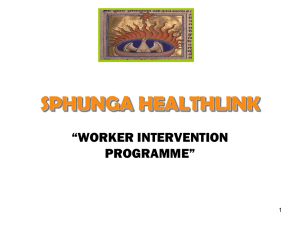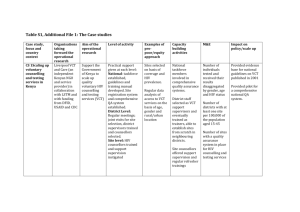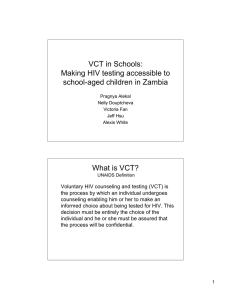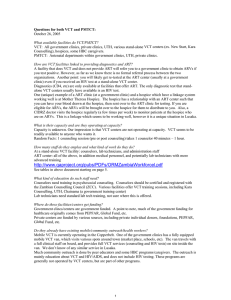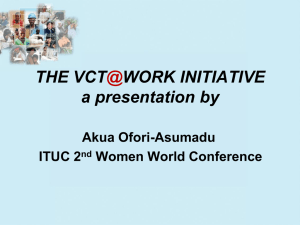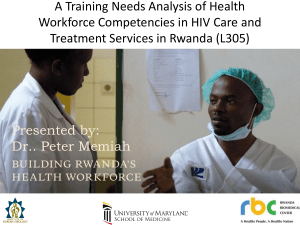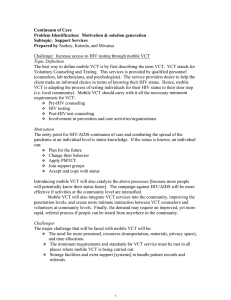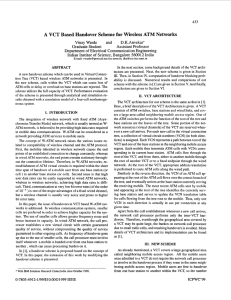Continuum of Care: Subtopic problem identification Indentified by
advertisement
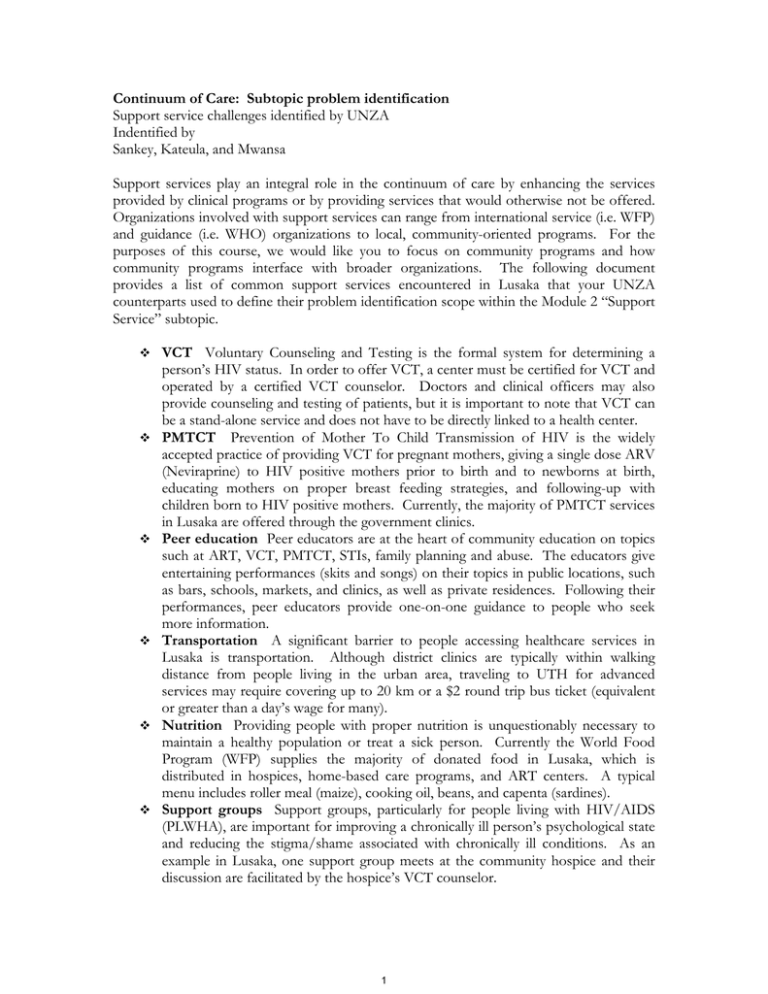
Continuum of Care: Subtopic problem identification Support service challenges identified by UNZA Indentified by Sankey, Kateula, and Mwansa Support services play an integral role in the continuum of care by enhancing the services provided by clinical programs or by providing services that would otherwise not be offered. Organizations involved with support services can range from international service (i.e. WFP) and guidance (i.e. WHO) organizations to local, community-oriented programs. For the purposes of this course, we would like you to focus on community programs and how community programs interface with broader organizations. The following document provides a list of common support services encountered in Lusaka that your UNZA counterparts used to define their problem identification scope within the Module 2 “Support Service” subtopic. VCT Voluntary Counseling and Testing is the formal system for determining a person’s HIV status. In order to offer VCT, a center must be certified for VCT and operated by a certified VCT counselor. Doctors and clinical officers may also provide counseling and testing of patients, but it is important to note that VCT can be a stand-alone service and does not have to be directly linked to a health center. PMTCT Prevention of Mother To Child Transmission of HIV is the widely accepted practice of providing VCT for pregnant mothers, giving a single dose ARV (Neviraprine) to HIV positive mothers prior to birth and to newborns at birth, educating mothers on proper breast feeding strategies, and following-up with children born to HIV positive mothers. Currently, the majority of PMTCT services in Lusaka are offered through the government clinics. Peer education Peer educators are at the heart of community education on topics such at ART, VCT, PMTCT, STIs, family planning and abuse. The educators give entertaining performances (skits and songs) on their topics in public locations, such as bars, schools, markets, and clinics, as well as private residences. Following their performances, peer educators provide one-on-one guidance to people who seek more information. Transportation A significant barrier to people accessing healthcare services in Lusaka is transportation. Although district clinics are typically within walking distance from people living in the urban area, traveling to UTH for advanced services may require covering up to 20 km or a $2 round trip bus ticket (equivalent or greater than a day’s wage for many). Nutrition Providing people with proper nutrition is unquestionably necessary to maintain a healthy population or treat a sick person. Currently the World Food Program (WFP) supplies the majority of donated food in Lusaka, which is distributed in hospices, home-based care programs, and ART centers. A typical menu includes roller meal (maize), cooking oil, beans, and capenta (sardines). Support groups Support groups, particularly for people living with HIV/AIDS (PLWHA), are important for improving a chronically ill person’s psychological state and reducing the stigma/shame associated with chronically ill conditions. As an example in Lusaka, one support group meets at the community hospice and their discussion are facilitated by the hospice’s VCT counselor. 1 Problem Identification/Challenges in Support Services Overall, 4 problem areas were identified by UNZA which included VCT, PMTCT, transportation, and nutrition. Upon further discussion, the challenges in VCT and PMTCT proved more interesting to the UNZA students, better suited the context of this course, and showed greater potential for developing into a realistic program. Briefly, the problem identified in nutrition services involved expanding the availability of a balanced diet beyond sick people and generating more self-sustaining supplies of fruits and vegetables while the problem identified under transportation related to improving physical access to UTH. 1) Increasing VCT accessibility through mobile services VCT, a well-defined and coordinated program in Lusaka, is critical for people to know their HIV status. Currently, the number of people receiving VCT is insufficient; many people refuse counseling and don’t know their HIV status. Furthermore, community health workers with a strong community relationship, such as peer educators and home based care workers, are often limited in their capabilities to provide HIV counseling and testing services. Accordingly, the challenge in VCT is to increase accessibility through mobile services linked to either peer education or home based care. 2) PMTCT newborn follow-up at government clinics Government clinics provide PMTCT to mothers through VCT, single dose mother and child ARV medication, and breast feeding education. However, a major gap in the system lies in monitoring the child’s status once he or she leaves the maternity ward. Children begin with a new set of patient records (often not including the mother’s HIV status) in a new department, which adds complexity to patient follow-up. The challenge here is enhance the PMTCT support service so that children born to HIV positive mothers have a continuity of care that begins prior to birth. 2 MIT OpenCourseWare http://ocw.mit.edu EC.S11 Engineering Capacity in Community-Based Healthcare Fall 2005 For information about citing these materials or our Terms of Use, visit: http://ocw.mit.edu/terms.
